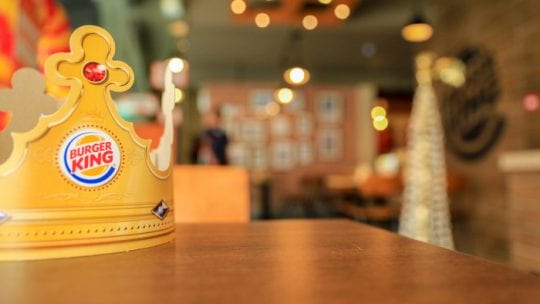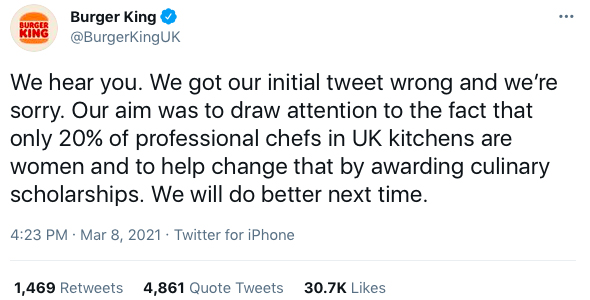
Pardon the metaphor, but Burger King UK’s March 8 tweet, “Women belong in the kitchen,” requires a lot of peeling back of the onion.
You read that correctly; the tweet came from Burger King UK. It was meant to highlight a Burger King Foundation Initiative timed for March 8, International Women’s Day.
In the U.S., the initiative sets aside $50,000 for at least two culinary arts scholarships for female employees of Burger King. The program is called H.E.R. (Helping Equalize Restaurants).
A H.E.R. print ad, run in the US, also begins with the offending five words: ‘Women belong in the kitchen.’ Fortunately, the ad also offers several paragraphs explaining the scholarships.
To Respond or Not?
One of the most difficult moments for crisis communicators is knowing when, or even if, to react. Once you decide to act, finding a proper response is critical.
The backlash against Burger King UK’s tweet was immediate. The company, though, seemed to forget a motto it used for 40 years: ‘Have It Your Way.’
Instead, after choosing to respond, it doubled down with explanations.
One explanatory tweet noted women should be in the kitchen “Only if they want to...yet only 20 percent of [U.K.] chefs are women. We’re on a mission to change the gender ratio in the restaurant industry by empowering female employees with the opportunity to pursue a culinary career.”
In the U.S., 24 percent of chefs and 7 percent of head chefs are women.
Later in the day, Burger King UK apologized (see below) and later removed its offending tweet. The brand said it didn’t want to keep the space open for “abusive comments in the thread.”

Crisis Averted?
So, after roughly one month has passed, we ask the question from which this column derives its name: Did Burger King avoid a crisis?
“The fact that we’re still talking about it now probably answers that! No, they didn’t avert a crisis by taking the post down and apologizing,” says Hanah Patel, director, at UK-based Red Lorry Yellow Lorry.
On the other hand, Patel adds quickly, “I’m sure [the incident] hasn’t stopped anyone buying cheeseburgers and fries. I doubt [Burger King] is feeling the business impact too much.”
Rohini Mukherji, VP, Apex PR, agrees with Patel about the lack of financial hurt. Fast food, which had a carry-out option before the pandemic, is doing relatively well compared to the rest of the sector, she notes. Burger King venues in North America have bounced back since early in the pandemic.
Unlike Patel, she thinks the crisis was averted, though admits the tweet “was definitely a misfire.”
On the other hand, Mukherji believes the message, as intended, was not off brand for Burger King UK. “Burger King UK has a reputation for being bold” in its ads and social media “and for taking a stance on important topics within the industry and outside it.”
The brand, she says, is known for joining conversations.
In fact, she believes this incident will serve Burger King UK well, eventually. “Look, anytime you are bold, you will put a foot in your mouth at some point.”
All Burgers Are Local
The two crisis pros agree few people know that Burger King UK was responsible for the offending tweet. Moreover, it doesn’t matter, they say.
“[At first] I didn’t even realize it was Burger King UK...and I’m based in the UK,” Patel says. “The brand is synonymous with the U.S., so I would consider [the tweets’] impact across the brand globally, not just in the market that posted the content.”
Crisis Control
Patel blasts Burger King UK for failing to take down the post immediately. In addition, she whacks Burger King for trying to “mansplain” the tweet’s context.
“If more people than not find something you’ve posted offensive, then it probably is,” she says. “Arguing that it’s been taken out of context isn’t an excuse.”
Essentially, Burger King UK told people “not to have a sense-of-humor failure. They waited until it blew up before they did anything about it, probably because someone, who likely knows nothing about PR, once told them, ‘Any PR is good PR.’”
The Apology and Diversity
Mukherji agrees with Patel on some basic points. Yes, she says, the apology could have come quicker. In addition, Burger King UK could have taken down the offending post faster.
Yet, she emphasizes the goal in reacting was “sincerity, not speed.” It was a “good” apology, Mukherji says. There was no ‘If we offended anyone...’ It was ‘We’re sorry.’ She adds, “The direct apology seems simple, but so many companies and people do it badly.”
Like Patel, Mukherji, a Diversity Equity and Inclusion specialist, wonders about the issue-testing in this case.
“Did a woman post that thread? I doubt it.” The incident, she says, is a lesson in the importance of diverse input. When you want to post something about a group–women in this case–run it by members of that group, she says.
In many cases, social posts need executive approval. Yet, if there’s a lack of diversity at the top, an offensive post can get through.
Another issue, is more nuanced. A communication team may be diverse, but its diverse members must have have authority to veto a social post or a campaign approach. “You can do that anonymously,” Mukherji says.
The two also agree about the importance of being careful when using humor. Humor can help a brand stand out, but it may offend. Since humor is not a one-size-fits-all tactic, Patel says, make sure to test it.
